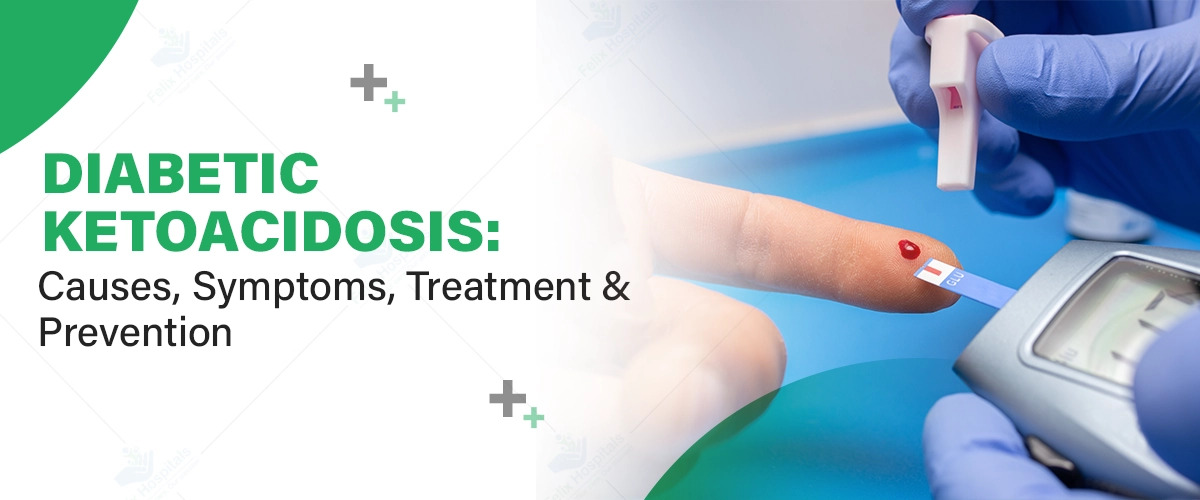
Subscribe to our

Diabetic Ketoacidosis (DKA) is a serious condition that affects people with diabetes. It requires immediate medical attention as it can lead to diabetic coma, organ failure and even death. The condition occurs when the body can’t produce enough insulin, and instead, it produces high levels of blood acids called ketones. DKA is more common in individuals with type 1 diabetes. Since it is a potentially fatal condition, early detection and timely treatment are essential to avoid its serious side effects.
So, if you or someone you know is diabetic and suspect symptoms of Diabetic Ketoacidosis, seek immediate care at Felix Hospital, the best endocrinology hospital in Noida. Our diabetes experts are trained to provide accurate diagnosis and advanced treatment.
Book a consultation with our endocrinology team for expert care and personalized treatment plans for diabetes and its complications.
When the body doesn’t have enough insulin to control blood sugar (glucose) levels effectively, it causes Diabetic Ketoacidosis. Without insulin, glucose cannot enter cells, forcing the liver to break down fat too fast for fuel. This process produces ketones that are normally used by the muscles and the heart. However, when ketones are produced too fast, they start to accumulate in the blood, thereby making the blood more acidic. This condition is known as ketoacidosis.
DKA should be treated as a medical emergency since it is a potentially fatal condition. It typically occurs in people with type 1 diabetes who miss insulin doses, experience illness, or encounter emotional stress or trauma. Understanding its causes and symptoms can help with early detection and treatment.
Several factors can contribute to the onset of Diabetic Ketoacidosis. In fact, DKA is sometimes the first sign of type 1 diabetes in people who have not yet been diagnosed.
Recognizing the symptoms of Diabetic Ketoacidosis early is critical for prompt intervention. Some of the common symptoms include:
As mentioned, diabetics, especially the type 1 types, can get Diabetic Ketoacidosis. Some people find out that they have diabetes only after they get DKA. However, there are certain risk factors that make you more likely to get DKA. These include:
Ketone testing is used in diabetes patients to check for early ketoacidosis. The ketone test is usually done using:
Early diagnosis can prevent complications, so it’s crucial to consult an endocrinology specialist for a thorough evaluation.
The primary goal of DKA treatment is to stabilize high blood sugar levels with insulin and correct metabolic imbalances. This involves:
Diabetes patients can check ketones at home with home kits available over the counter. Some glucose meters can also test for ketones in the blood sample when patients do a finger prick.
Most people respond to DKA treatment within 24 hours. Sometimes, it takes longer to recover. If DKA is not treated, it can lead to severe illness or a patient could go into a coma, and possibly die.
DKA complications are possible if you don’t seek emergency treatment. Some of the health problems that may result from DKA include:
Therefore, it’s advisable to prevent Diabetic Ketoacidosis. This is possible with good blood sugar control and careful management of diabetes, that includes:
Recognized as one of the best Endocrinology hospitals in Noida, Felix Hospitals has a team of experienced endocrinologists and diabetologists dedicated to providing top-notch care for diabetes and its complications, including Diabetic Ketoacidosis. Our team, led by Dr Vimal Gupta, uses advanced diagnostic tools and evidence-based treatments to ensure patient safety and recovery.
Whether you’re seeking preventive advice or emergency care, Felix Hospitals offers comprehensive support for managing diabetes and maintaining endocrine health. Schedule an appointment today to meet the best diabetes specialist.
We also provide diagnosis and treatment for pediatric and gestational diabetes. Contact us at: +91 9667064100.
Diabetic Ketoacidosis is a serious medical condition that requires immediate attention and proper management. While it can be life-threatening, early detection and timely treatment significantly can improve outcomes. By understanding the causes, symptoms, and taking preventive measures, individuals with diabetes can minimize their risk of developing DKA.
Felix Hospitals, Noida offers expert endocrinology care to help you manage your diabetes effectively. From state-of-the-art diagnostics to personalized treatment plans, our team is dedicated to your health and well-being.
1. How long does it take to recover from diabetic ketoacidosis?
Ans: The goal of diabetic ketoacidosis treatment is to get your blood back into balance and lower your blood sugar. That way, your body won’t make ketones anymore. This usually takes about 24 hours, but it might take longer if your DKA was severe or didn’t get treated soon enough.
2. Who is at risk of DKA?
Ans: People with type 1 diabetes are at the highest risk, but it can also occur in individuals with type 2 diabetes under certain conditions.
3. Can DKA be prevented?
Ans: Yes, by managing blood sugar levels, taking insulin as prescribed, and monitoring for ketones during illness or stress.
4. What are the two types of Ketoacidosis?
Ans: Two types of diabetic ketoacidosis include: hyperglycemic and euglycemic. Hyperglycemic means that you have high blood sugar levels, and euglycemic means you do not.
5. What are possible complications of diabetic ketoacidosis?
Ans:
6. At what sugar level is diabetic coma?
Ans: When an individual's sugar level in the blood and the brain drops to below 3.5 mmol/l, they are at risk of falling into a diabetic coma.
7. What are signs of a diabetic emergency?
Ans: Someone who is hypoglycaemic (having a low blood sugar) may have symptoms including: sweating, feeling drowsy and confused, unconscious and unresponsive.